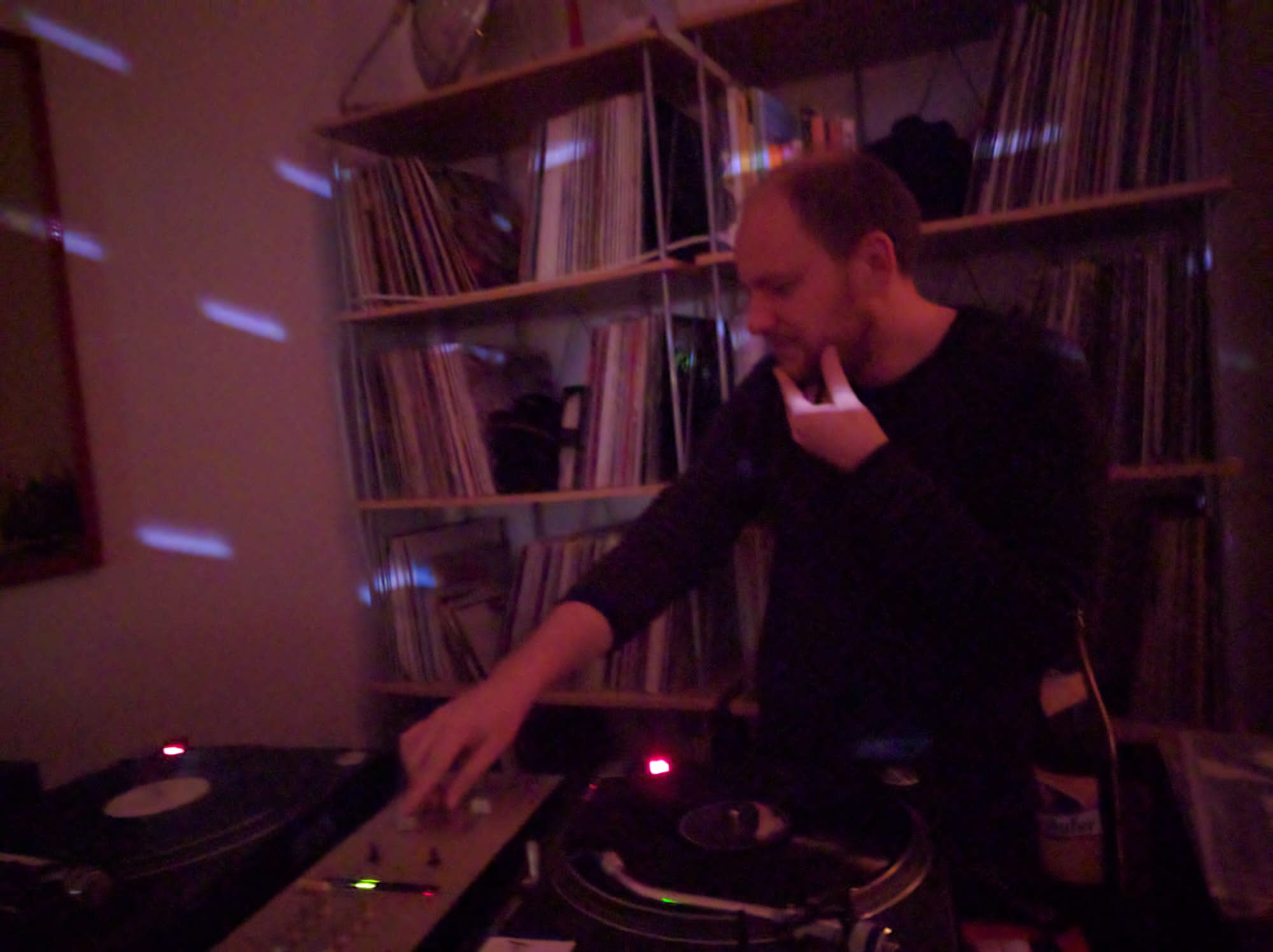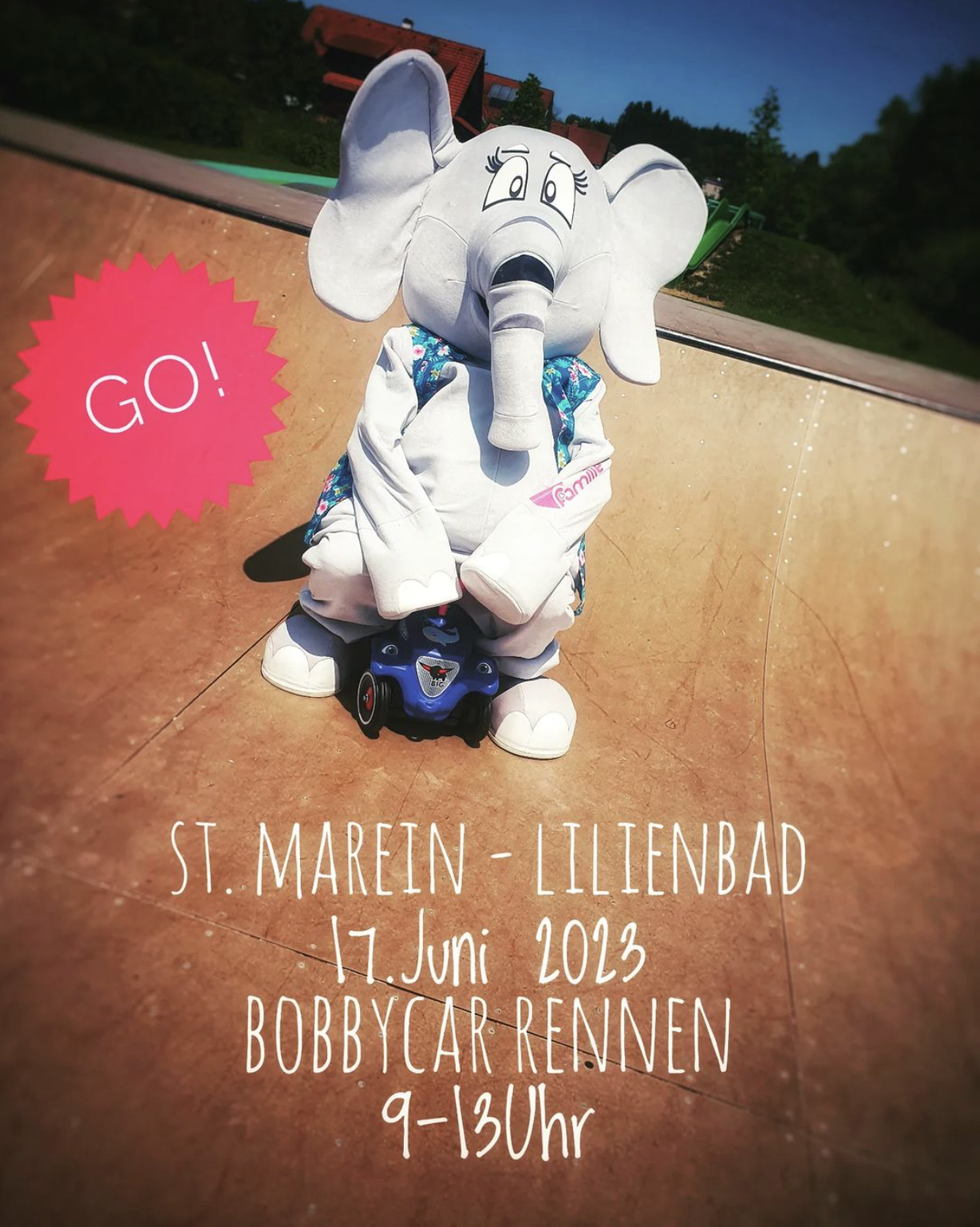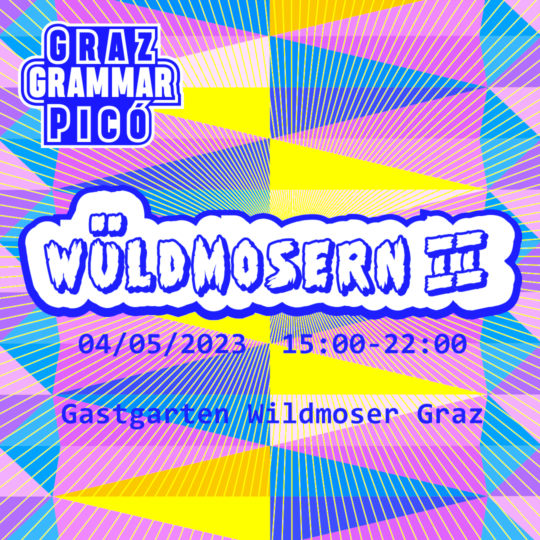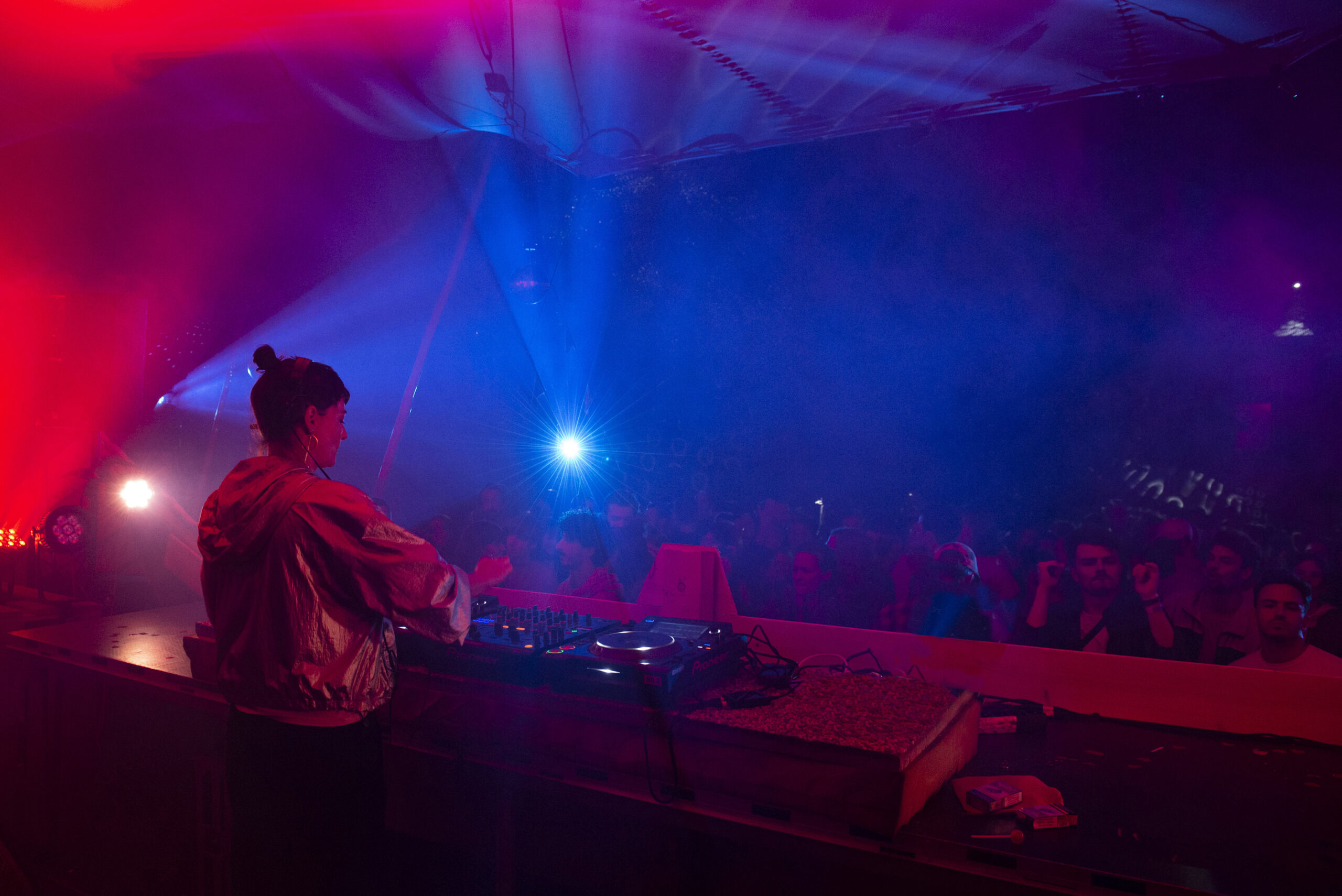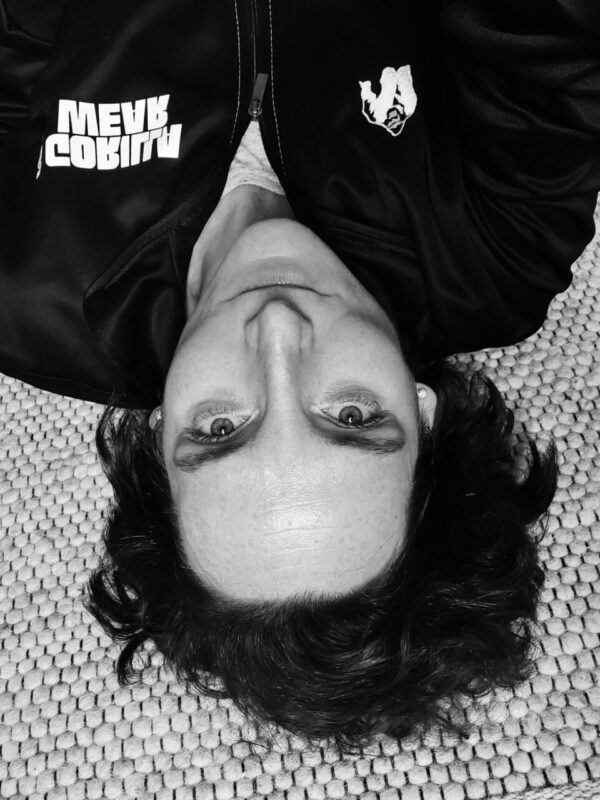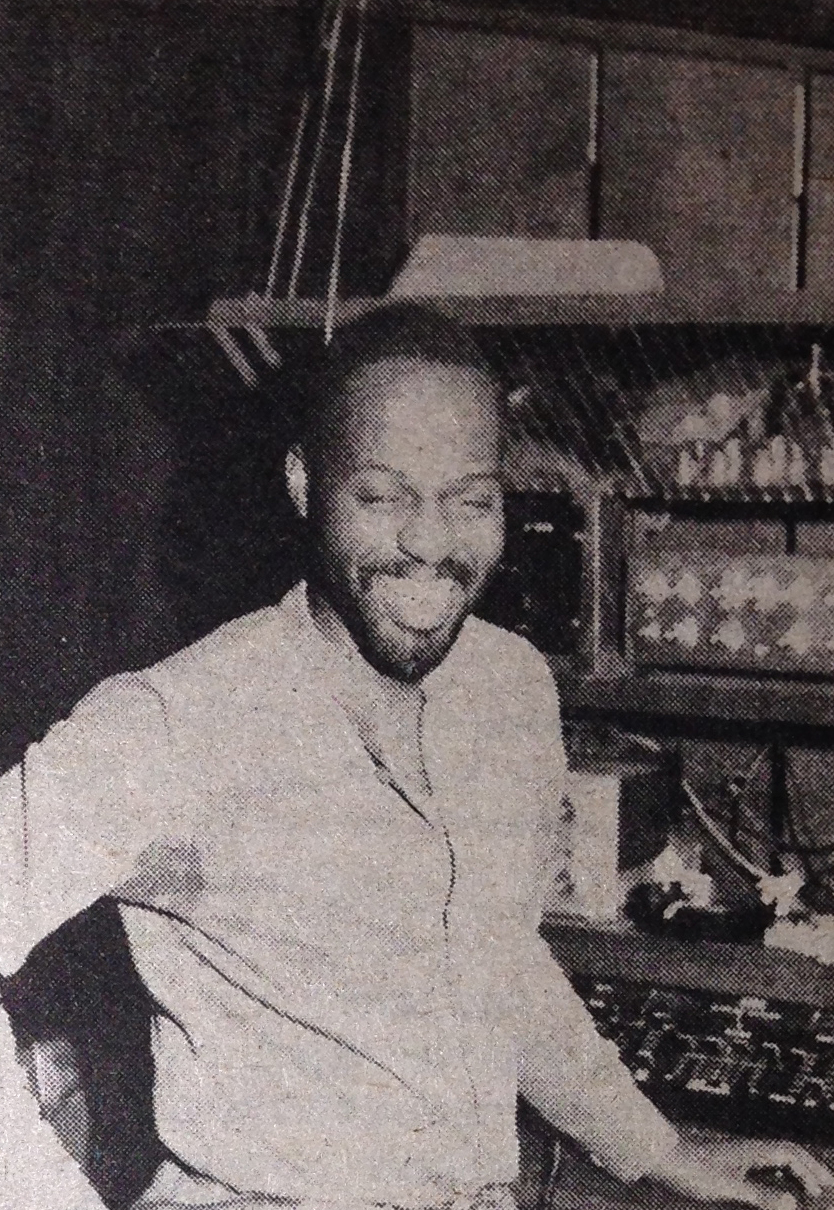Seit über 15 Jahren beehrt DJ Saus’n’Browse die Grazer DJ Szene zu besonderen Events, ist Resident-DJ und Mitbetreiber der Kombüse Graz. Er ist passionierter Plattensammler mit musikalisch internationalen Perlen die man nur äußerst selten zu hören bekommt.
Carline
DJ Carline legt seit dem Kulturhauptstadtjahr 2003 Platten auf. Nach der DJ Residency im Forum Stadtpark Keller und eigener Veranstaltungslinie in Berlin ist sie seit 2017 Teil der GRRRLs DJ Crew. Mit Liebe zu souligem Reggae und tanzbaren, warmen Sounds mit einem guten Beat ist sie regelmäßig DJ in der Kombüse und beim WHERE SWALLOWS FLY BACKWARDS Festival.
Picture credit: © Caroline Bohn
Herzfamilien-Sommerfest mit Sankt-Mareiner-Bobby-Car-Rennen
Beim Herzfamilien-Sommerfest mit den Sankt-Mareiner-Bobby-Car-Rennen gibt es ein vielfältiges Programm mit Hupfburg, „Meet & Greet“ mit dem Herzfamilie-Maskottchen Elefant Ono u.v.m. Für die musikalische Umrahmung sorgt das Graz Grammar Picó Sound System.
B.R. White
MAYA
Lendwirbel – Musik-Hotspot am Lendplatz
Der Graz Grammar Picó startet mit einem „concert surprise“ direkt am Lendplatz südlich der Markthalle in das großen Wirbeln am Samstag Nachmittag und abends. Worauf eine illustre Auswahl an DJs folgt, die mit ihren Sets die Körper in Bewegung versetzen werden. Read More
Maya
Monique Fessl
Thomas Gell
Uschi Ultra
Maracatu Grupo
Lendwirbel – Musik-Hotspot am Floßlendplatz
Das Graz Grammar Picó Sound System bietet zwei musikalischen Highlights die Bühne:
– „Wilhelm shows me the Major Label“ mit den Bands „The Damski“ und „Lonesome Hot Dudes“ sowie dem
– DJ Kollektiv Afrodisiakum
Read More
Wüldmosern II
Rund um den Lendwirbel starten wir in den Frühling der Gefühle. Beim 2. Wüldmosern wird der Gastgarten des Lokals Wildmoser mit Musik aus ferneren Gefilden in affektive Rhythmen, Tunes & Sounds getaucht.
B.R. White
Maya
Mircea
Monique Fessl
Der Fokus von Monique Fessl liegt in beat- und basslastiger elektronischer Musik aus den Bereichen Techno, Bass, Juke und Footwork. Als Produzentin, DJ und Musikerin kann sie in den letzten 20 Jahren auf zahlreiche eigene Releases und Remixes von nationalen und internationalen Künstler*innen verweisen. Ihre Handschrift ist ein kompromisslos nach vorne treibendes perkussives Gerüst, auf das Schicht um Schicht elektronische Layer gelegt werden, bis ein druckvolles Soundkonstrukt mit 120 bis 160 Bpm entsteht. Zeitweise Ausflüge zu wegweisenden Popmelodien der Musikgeschichte bestätigen nur die Regel – Techno is in the heart. Derzeit wird an einem neuen Album gearbeitet, dass Mitte 2023 veröffentlicht werden soll.
CONTACT
monique.fessly[at]gmx.at
www.moniquefessl.net
+43 (0)650 60 58 310
LINKS
Soundcloud
In the Mix for FM4 La Boum the Luxe
The Mind Made Self (www.grrrls.at)
In the Mix for FM4 La Boum the Luxe II
MOET – Hit Doubling (Monique Fessl + Marta Navaridas)
Instagramm
Picture credit: © rostfest
Maya
Der Musikstil meiner DJ-Sets ist der Ausdruck meiner Kreativität, Verspieltheit und Vielfalt. Das kann aus World Music, Hip-Hop, Techno, House, Reggae/Ragga, Ambient, Chill-Out und vielem mehr gestaltet werden. Durch meine lange Zeit im Ausland lebend, konnte ich viele verschiedene musikalische Eindrücke sammeln. Eine Zeitlang war das DJing und das Veranstalten von Events ein wichtiger Bestandteil in meinem Leben. Die Musik an sich begleitet mich schon ein Leben lang. Ich verstehe das DJing als zusätzliche Ausdrucksform. Mit Baby-Pause, Kindererziehung und neuer Lebensrichtung, freut es mich sehr wieder am DJing zu sein.
El Pikó Electrikó – A programmatic song
El Pikó Electrikó – A programmatic song
A 7 Inch vinyl of the collective “Systema Solar” has a B side with the song “El Pikó Electrikó”. The title of the song together with the name of the collective seems to be a programmatic statement for the contemporary interpretation of the Picó Culture, how we would like to define it.
The label “Galletas Calientes Records” released in 2017 the 7-inch vinyl “El Botón Del Pantalón / El Pikó Electrikó” of the Colombian collective “Systema Solar”, the kings of Berbenautika[1] from Colombia. The single features the already well-known Champeta[2] hit “El Botón Del Pantalón”, and an unreleased electronic Gaita[3] tune, “El Pikó Electrikó”. Only played live by the band, this B-side-track won’t be released on their forthcoming album.
The single was the first release of the series “Galletas Bailables”. The label “Galletas Calientes Records” (France/Colombia) founded this sub-label only for their 7-inch vinyl releases. These delicious cookies to dance to will take you to a journey into Colombian, Latin American and European modern folklore: Champeta[2], Cumbia[4], Balkanica[5], Porro[6], Currulao[7], Bullerengue[8], Salsa[9], Charanga[10], Descarga[11], Pachanga[12], blended with electronic music and Hip-hop are among the genres the label will try to compile for an interested audience.
Fernando González[13] writes online at a page called “The International Review of Music” about the collective “Systema Solar”: „Post-modernism might be a cool, interesting artistic choice in wealthy cultures, but in Latin America recycling, repurposing, mixing and matching, and generally ignoring stylistic rules is both a way of life and a necessity. ‘Systema Solar’, a Colombian collective that freely mixes Hip-hop, Rap, and Techno with Afro-Colombian grooves, traditional instruments and Colombia’s own ideas about sound systems[14], is Latin American ersatz post-modernism at its best – razor sharp, and fun.
Formed in late 2006 for a performance at the opening ceremony of the biennial of contemporary art of Medellin in 2007, the group includes MC John Primera, vocalist Indigo, producer Pellegrino[15] (called the group’s sonic architect), DJ Daniboom[16], VJ Pata de perro (Dogleg) and DJ Corpas. They call their approach Berbenáutika[1], a made-up definition that alludes to two young traditions on the Caribbean coast of Colombia: the [P]ikós[13], or Colombian sound systems, which also feature singing, rapping and live playing; and the verbenas[17], or street parties in Cartagena and Barranquilla. The music is an irresistible mix of traditional rhythms such as the Cumbia[4], Porro[6], Bullerengue[8], Fandango[18], Champeta[2] and other modern Afro-Pop styles with [H]ip–hop, Techno, Rap and scratching. Add some live VJ, pointed (and often funny) lyrics, and you have, well, a true, moveable Verbena[17]. […] this is party music with smarts, purpose and a sense of humor. To inventory and analyze all the parts would only miss the point of the whole. Well beyond the talk about modernity, tradition and meaningful messages, a big part of Systema Solars’ appeal is its vitality, energy and sense of fun. With a nod to noted philosopher and funkmaster Bootsy Collins, the message here is simple: Free your ass and your mind will follow.”[19]
Footnotes
[1] Berbenautika to put it in simple terms means that Systema Solar create through their music an imaginary state of bliss in where they are the cosmonauts traveling and spreading thumping Caribbean parties
[2] Roughly a modern, Colombian re-working of Congolese Soukous
[3] Eyes On Colombia/The Colombian Gaita
[4] Cumbia! Scenes of a Migrant Latin American Music Genre
[5] Modern Balkan music
[6] Colombias own sub-genre of Cumbia
[7] Currulao es un género musical que se baila principalmente en la región Pacífica, aunque estrictamente hablando, también hace referencia a la danza folclórica de la región del Pacífico de Colombia.
[8] Bullerengue is a traditional musical genre and dance from the Caribbean Region of Colombia and the Darién Province in Panama.
[9] Salsa music is a style of Latin American music.
[10] Charanga-vallenata is a style of Latin music that combines conjunto, charanga and vallenato-style accordion.
[11] Cuban genre consisting of improvised jam sessions incorporating elements of Jazz and Afro-Cuban music. In the musical context of ‘Salsa’ or Afro Cuban popular music the term ‘Descarga’ is the equivalent of a Jam Session.
[12] Pachanga is a genre of music which is described as a mixture of son montuno and merengue and has an accompanying signature style of dance.
[13] About Fernando González
[14] Pico! Pico! Pico! The technicolour sound systems of Barranquilla – in pictures or e.g. Uraba Sound System: Sounding with purpose
[15] INTERVIEW: Systema Solar’s Juan Carlos Pellegrino on Their Latest Album ‘Rumbo a Tierra’
[16] Dani Boom – Boiler Room Bogotá DJ Set
[17] Verbana is a special kind of Urban street party
[18] Der Fandango ist ein spanischer Singtanz, dessen Ursprung in Amerika vermutet wird.
[19] Galletas Bailables 01 – Systema Solar – Galletas Calientes – Toolbox records – your vinyl records store
Sources
– LAMC Preview: Systema Solar
– Systema Solar – El Botón Del Pantalón / El Pikó Electrikó | Galletas Calientes Records
– Latin CD Review: “Systema Solar” – – The International Review of Music
— Galletas Bailables 01 – Systema Solar – Galletas Calientes – Toolbox records – your vinyl records store
– INTERVIEW: Systema Solar’s Juan Carlos Pellegrino on Their Latest Album ‘Rumbo a Tierra’
Discokultur. Nur hedonistische Sause oder hochpolitisch?
Warum ist Discokultur nicht nur eine hedonistische Sause, sondern von seiner radikalen Idee her auch hochpolitisch?
Ein Interview aus der TAZ von Finn Johannsen mit Tim Lawrence, dem Autor dreier Bücher zur „Urban Dance Music Culture“ zeigt hochspannende Bezüge zwischen der frühen Disco-, Party- bzw. Clubkultur der frühen 1970-er Jahre und damaliger sowie gegenwärtiger politisch-gesellschaftlicher Phänomene. Die rechten und reaktionären Tendenzen der Politik, etwa die eines Donald Trumps, sieht Tim Lawrence schon beginnend mit der „Disco Demolition Night“, in der am 12. Juli 1979 ein lokaler Radio-DJ dazu aufforderte, Disco-Platten ins Comiskey-Park-Stadion in Chicago mitzunehmen, um sie dann dort spektakulär in die Luft zu jagen. Discokultur wurde hier instrumentalisiert, um den Frust der weißen Bevölkerungsgruppe, die sich ökonomisch abgehängt fühlte und deren einfache Weltbilder für eine zunehmend komplexer und diverser werdende Gesellschaft nicht mehr funktionierten, Ausdruck zu verleihen.
Anfänglich recherchierte Tim Lawrence für sein Buchprojekt in der amerikanischen DJ-Szene. Er interviewte dazu Proponenten der frühen House- und Clubmusik wie Tony Humphries, Frankie Knuckles [Siehe Foto] oder David Morales. Diese erzählten wiederum von ihren prägenden Einflüssen, wie etwa den sogenannten Loft-Parties in NYC und deren Gastgeber, dem DJ David Mancuso. Er empfahl Lawrence schon die Clubgeschichte vor der eigentlichen Zeit der Disco-Hochblüte in den frühen Siebzigerjahren in seine Recherche miteinzubeziehen.
Lawrences’ wichtigste Erkenntnis, nach der eingehenden Befassung mit der Materie bestand darin, dass die kulturelle Innovation in der Clubmusik passierte, als das „Zwiegespräch“ zwischen DJ und Publikum zu einer radikal neuen Handhabung der Musik führte.
Zudem war dieses Nachtleben Teil einer kulturellen Gegenbewegung. Es war eng verbunden mit den sozialen bzw. zivilgesellschaftlichen Bemühungen dieser Zeit in den Vereinigten Staaten. Dass die Clubkultur überwiegend Black Music, also von People of Colour geprägt war, scheint weder Johannsen noch Lawrence besonders erwähnenswert. Jedenfalls stand die frühe Discokultur in direkter Verbindung zur Schwulen-, Lesben-, Bürgerrechts-, Frauenrechts- sowie der Antikriegsbewegung. Aber auch LSD-Experimente waren Teil der damaligen Erfahrungen.
Mit dem Elevate Festival, welches seit Jahren die Verbindung von politischem Diskurs und Clubkultur erprobt, ist Graz in diesem Sinne ein guter Ort. Das Graz Grammar Picó Sound System versteht sich ebenfalls als lebendiger Beitrag zu dieser Gegenkultur.
Interview von Finn Johannsen mit Tim Lawrence nachzulesen in der „TAZ – Kultur/Musik Online“ [Titel: Disco-Kultur in New York: „Alle Wege führen zurück zum Loft“] erstellt am 5. 2. 2017, 10:56 Uhr und abgerufen am 25.11.2022, 15:05.
Homepage von
Tim Lawrence:
Bücher von Tim Lawrence:
– Love Saves the Day: A History of American Dance Music, 1970 – 1979
– Hold On to Your Dreams: Arthur Russell and the Downtown Music Scene, 1973 – 1992
– Life and Death on the New York Dance Floor, 1980 – 1983

